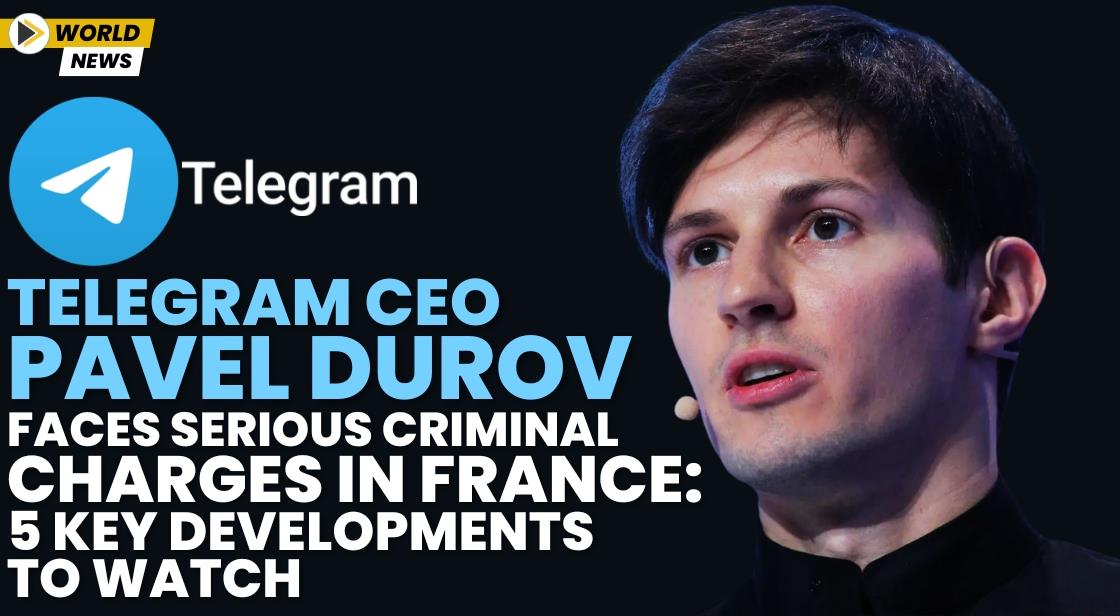Telegram CEO Pavel Durov Faces Serious Criminal Charges in France: 5 Key Developments to Watch

News Synopsis
On August 25, Telegram CEO Pavel Durov was arrested at Le Bourget Airport in France, marking a significant moment in the ongoing investigation into criminal activities associated with the messaging platform. The arrest, which occurred as Durov disembarked from his private jet, has led to serious legal challenges, with Durov facing multiple charges. This article provides an in-depth look at the allegations against Durov, the legal conditions of his release, Telegram's response, and the broader implications of the case.
Allegations Against Pavel Durov: A Serious Accusation
The French authorities have brought forward grave allegations against Pavel Durov, accusing him of complicity in several criminal activities. Central to these accusations is the claim that Durov enabled the distribution of child pornography, drug trafficking, and fraud through the Telegram platform. French prosecutor Laure Beccuau has highlighted the platform's alleged failure to moderate illegal activities, which has raised significant concerns about Telegram's role in facilitating these crimes.
The charges suggest that Telegram has become a haven for illegal transactions and communications, allowing criminals to exploit its robust encryption features to evade detection. Moreover, the allegations extend to Durov's alleged non-cooperation with law enforcement, which further complicates his legal standing. These serious charges have not only put Durov in the spotlight but have also raised questions about the responsibility of tech companies in monitoring and controlling the activities that take place on their platforms.
Telegram’s Alleged Non-Cooperation and Criminal Facilitation
Beyond the direct accusations against Durov, Telegram itself is facing criticism for its alleged role in facilitating criminal activities. The platform is accused of not only enabling these activities but also resisting cooperation with authorities. This resistance is said to include money laundering and the provision of encryption services that criminals can use to avoid law enforcement.
Telegram’s encryption features, while praised for protecting user privacy, are now under scrutiny for potentially aiding criminal organizations. The platform’s non-cooperation with law enforcement has led to further allegations that it has become a tool for organized crime. These legal challenges underscore the complex balance that Telegram must maintain between offering privacy and security to its users and complying with legal standards that prevent criminal exploitation.
Durov’s Arrest and Legal Conditions: A High-Stakes Case
The arrest of Pavel Durov was carried out under a warrant related to the ongoing investigation into Telegram's involvement in criminal activities. Following his arrest, Durov was subjected to 96 hours of questioning before being taken to court, where he was indicted on several serious charges. Despite the severity of these charges, Durov was released on a bail of 5 million euros, with stringent conditions attached to his release.
As part of his bail conditions, Durov is required to remain in France and report to the police twice a week while the investigation continues. These conditions reflect the gravity of the charges against him and indicate that the French authorities are taking the case very seriously. The legal proceedings against Durov will be closely monitored, as they could set a precedent for how tech CEOs are held accountable for the activities that occur on their platforms.
Telegram’s Denial of Allegations: A Firm Defense
In response to the serious charges, Telegram has categorically denied any wrongdoing. The company has described the allegations as "absurd" and emphasized that Durov has "nothing to hide." Telegram has stated that it complies with European Union laws, including the Digital Services Act, and adheres to industry standards for content moderation.
In a statement posted on X (formerly Twitter), Telegram reiterated its commitment to user privacy and independence, asserting that it is continually improving its content moderation practices. However, the strong denial of the allegations has also raised questions about the effectiveness of Telegram’s policies in preventing illegal activities. While the company defends its practices, the ongoing legal challenges highlight the need for a more robust approach to content moderation.
Broader Implications for Free Speech and Governmental Overreach
The case against Pavel Durov and Telegram has broader implications for the tech industry, particularly for platforms that prioritize privacy and encryption. Western governments have increasingly pressured companies like Telegram to moderate content more aggressively, especially in light of concerns that encryption can facilitate criminal activities.
Durov's arrest underscores the potential risks for tech executives who resist government demands for greater control over content. This situation raises important questions about the balance between free speech, user privacy, and the need for effective law enforcement. As governments push for more stringent regulations, there is a growing concern about the potential for governmental overreach and the stifling of dissenting voices.
The broader issue at play is the challenge of navigating the complex landscape of regulation and freedom of expression. While protecting users' privacy is essential, there is also a need to ensure that platforms like Telegram do not become safe havens for criminal activities. The outcome of this case could have far-reaching consequences for the tech industry and the future of digital communication.
Conclusion: The Road Ahead for Pavel Durov and Telegram
As the legal proceedings against Pavel Durov continue, the world will be watching closely to see how this case unfolds. The allegations against Durov and Telegram are serious, and the outcome of this case could set a significant precedent for the tech industry. The balance between privacy, security, and legal compliance is a delicate one, and this case highlights the challenges that tech companies face in navigating these issues.
For Durov and Telegram, the road ahead is fraught with legal and reputational challenges. As the investigation continues, the tech world will be paying close attention to the implications of this case for the future of digital communication and the responsibilities of tech platforms in preventing and addressing criminal activities.
You May Like









